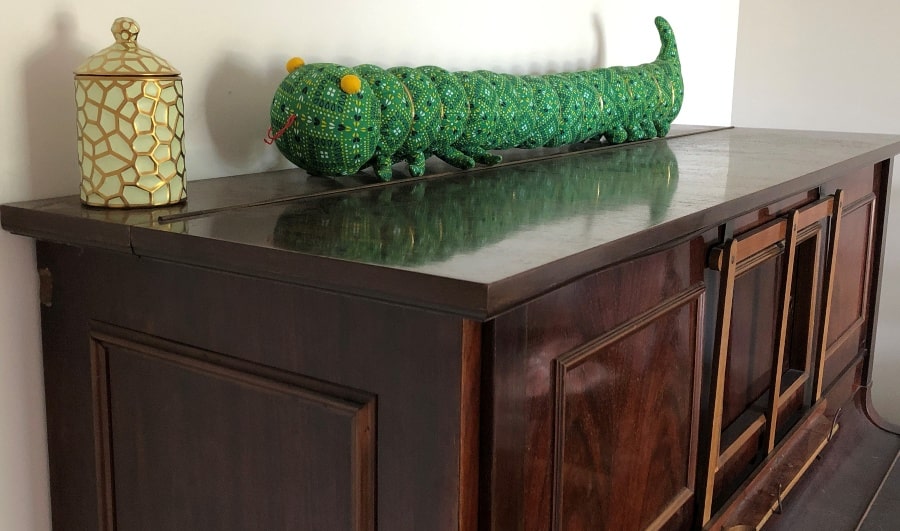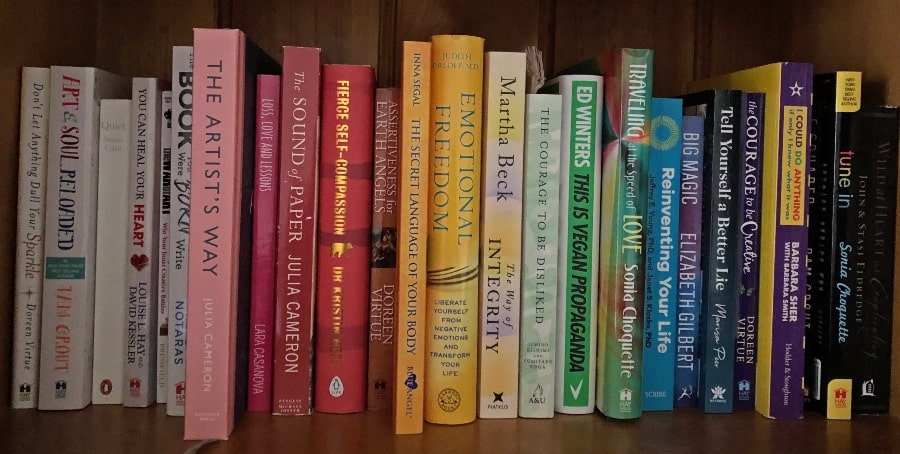Here in the Southern Hemisphere spring has just sprung, and for a lot of people, it’s spring cleaning time! Personally I feel as though I’ve been “spring cleaning” for the last few years on an ongoing basis. It’s become a daily habit to do a bit of organising or decluttering here and there. But since I’ve delved into decluttering, organising and minimalism on a much deeper level, I’d like to share with any other beginner or seasoned space-organiser my top tips that I’ve come across or realised myself so far on my journey to a simpler life with less stuff.
Disclaimer! No copyright infringement is intended for ideas I present that are someone else’s and I haven’t credited them specifically. I read a lot and have consumed so much decluttering and organising content that I genuinely forget where I’ve come across something.
1) Just because you have space, it doesn’t mean you have to fill it with stuff
I’m not sure where I heard this or if it just came to me one day, but it’s a phrase that’s been going around in my mind with no known origin.
When I first moved in to the place I currently inhabit and people came to visit, the comments were often focused around how there was space and what was I going to put in the space? The walls were bare, what was I going to put on them? The bookshelves had space, what books was I going to put on them?
I usually replied with something vague, because I didn’t quite know how to tell people that I liked having bare walls and spacious areas. It made me feel freer and less claustrophobic and drowning in stuff. It helped my mental state, and there was a correlation between the amount of stuff I had and the amount of stress and overwhelm I experienced.
Since that experience, I’ve come to the conclusion that just because you have space, it doesn’t mean you have to fill it. No matter what other people or society tell you or expect of you. I mean you can fill it if that’s what you choose.
Use space wisely, but there’s no obligation to fill up every spare corner and shelf with stuff (that you don’t really need).
This applies to not only physical stuff but also activities and obligations that you schedule into your day. Just because there’s space in your schedule, it doesn’t mean you have to fill it with something productive. If you do get bitten by the busyness bug, what are you avoiding by staying busy? Think about it.
2) Rainbow order your books!
I don’t know exactly where this originated from either, but organising things, particularly books, in rainbow order has been great.
It creates a really nice flow as well as a lovely aesthetic, which I find soothing to the soul and the mind.
I can’t quite explain it, but there’s something about rainbow organising that just makes things flow and instils a sense of calm to look at.
3) No number of tangible organising tools can help you if you have too much stuff (you need to get rid of the stuff!)
You can have all the organisational bits and bobs and latest organising hacks for any space you can imagine, but if you have too much stuff, then it’s likely that these organising tools won’t be able to do the job effectively.
This is where we need to get really honest with ourselves about our stuff. If we feel like even when we clean and tidy and put things away in a very organised fashion (maybe in rainbow order or colour coordinated), that the clutter and messiness is back within the space of a couple of days, then we seriously need to have a look at our stuff. Not the organising tools that we may conclude aren’t doing the job, but the stuff itself that makes it too difficult for the organising tools to do their jobs.
When it comes to tangible stuff, we need to declutter first, get organised second (with as many of those fun organising tools as you like!).
4) Keep an eye on flat surfaces
Flat surfaces are things like tables and benchtops i.e. side tables, coffee tables, kitchen tables, desks, or any kind of surface that is flat (to really make it clear what we’re talking about here).
From a lot of watching and reading about decluttering and organising, this seems to be a common trouble area for clutter to creep in, especially of the paper variety. It’s so easy to just dump something on a table or flat surface to deal with later. But eventually we have to deal with our stuff. Later is suddenly upon us.
What I would suggest is each day just spend a bit of time keeping an eye on those flat surfaces and see if any clutter is creeping on to them that you could make a decision about and deal with now, like filing away or throwing out the papers, putting away those odd bits and pieces, dealing with those things that we’ve decided not to deal with for the time being.
Find some time to deal with clutter on your flat surfaces.

5) Everything needs a home!
If you’ve been following my blog, you’ll know that I anthropomorphise my appliances and household items. What’s important is that everything has a home, and is put away in its home at night (to sleep or rest and recharge for the next day as I go to bed each night to do the same). But First, Coffee has some great content about giving everything a home and general decluttering and organising tips.
By giving everything a designated space (or home as I like to think of it), it’s a lot easier for us to organise our stuff and seems to take some hassle out of tidying. It also reduces the chance for clutter to creep back in after a good organising and tidying session, because you’ll know exactly where things need to be returned to and be able to make quick and effortless decisions about where to put things.
6) Decide on a time-based or space-based strategy
Clutter clearing, organising and tidying doesn’t have to be an overwhelming or stressful experience. I think the way we sometimes think of these things can lead us to believe we need to do everything in a day or a certain amount of time, and that’s not realistic.
This is why, if you’re someone who gets overwhelmed by the idea of clutter clearing because you have sooooo much stuff or not enough time or you’ve put it off for so long that everything seems like one big mess in every room and space, then having a strategy and getting into the right mindset first is important.
In fact, I’d say that having a strategy that works for you and getting into the right mindset before decluttering or organising is essential.
What I recommend after you’ve got your mindset sorted is either choosing a time-based strategy or a space-based/category strategy, which will be unique to you and your life circumstances.
Time-based examples could be:
- 10 minutes every day
- 15 minutes before bed every night
- One full day a week to just go for it
- Half an hour in the morning
- 2 minutes each morning, afternoon and evening
You get the idea. You’d be surprised how much decluttering and organising you can get done in ten minutes or even two minutes!
If you want to tackle things in a space-based or category way, some examples include:
- The top desk drawer and work down (or other drawers in the house)
- One room a day for a week
- The kitchen (or other full room)
- All flat surfaces at once
- Books
- Clothes
- Dealin’ with ya linens!
You can decide what amount of space or what category of thing you want to declutter and organise based on your unique circumstances and the pace that you’re ready to do this or feel comfortable doing this.
And of course you can combine the two. However you want to declutter and organise is fine.
7) Your home is a space for living not a space for storage
Home to me, as you found out a couple of weeks ago in this blog post here, 8 Ways I Create A Cosy And Nurturing Home Space, is a sacred space for replenishing, recharging and feeling safe and soothed. It has its own unique energy and each space within the home also has a unique living energy that’s important to keep flowing and high vibe.
The beings that inhabit the space are all living people, animals and house plants. Given this life force, it makes sense that home is a place for living, not a place for storing all your stuff and thus clogging the energy and life force.
Of course most of us store some things in our homes. I believe it’s about having the right balance, and at no point would I want storage and stuff to outweigh or overpower the living beings in the space.
8) A bit of decluttering and organising each day keeps the overwhelm at bay
This final tip is definitely one from yours truly.
Here’s an example of people who want to radically change their lives and change their routines or other aspects of life in major ways. I find that a lot of people fall into the trap of feeling like they need to do a complete life overhaul and then that pressure and the enormity of the task causes them to never take any action. But if they just approached life changes in, as Martha Beck calls them, ‘one degree turns’ (i.e. small actions each day), then soon enough they’d have overhauled their life and achieved their desired outcome. Taking things in small doses vastly increases the chance that you’ll get to where you want to get to in life if you feel you need to change.
The same concept applies to decluttering with the intention of having more space and less stuff. People may approach decluttering as a once a year “spring cleaning” exercise (and it can absolutely be done like that if that’s how you work best and if that’s what works for you, go for it) or decide to tackle it in a way that many would find overwhelming. If you have a lot of stuff, that’s typically overwhelming. So the thought of tackling all that junk in the one hit can be super overwhelming. Procrastination or delay tactics may ensue, potentially leading to conclusions like you’re naturally disorganised, can’t do it, it’s not for you etc. and results in nothing getting done. The stuff remains there clogging up your space and clogging up your life.
But if you find just a small amount of time or a small area or specific category to tackle every day (refer to point 6), no matter how minimal (one surface, putting dishes away, 10 minutes, rainbow ordering your favourite books etc.) at a time that works best for you, then you’ll have a much better chance of getting to the outcome you want – a clean and tidy home space!
Limiting the overwhelm and lowering the expectations helps declutter and organise immensely.
Final Thoughts and Bonus Tip!
At the end of the day, I’ve heard it said (by someone but I can’t remember who, typical) and I believe this to be the case that clutter is just postponed decisions. I also think that we’re very good at avoiding making these postponed decisions. Think about that for a second.
I suggest the takeaway from this post is to make the decisions. Stop avoiding stuff and deal with your stuff.
Decide what kind of strategy you want to go in with (time-based, space-based or both?), decide what works for you best, decide on a home for all your belongings, and decide what to do with your stuff and how you want to get organised.
For extra content, updates and other good stuff, feel free to join The Quiet and Curious folk community by signing up to the email newsletter below:
Much love and happy decluttering and organising!




